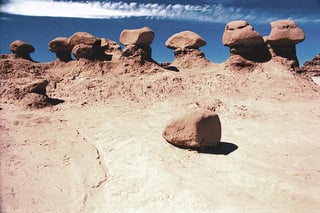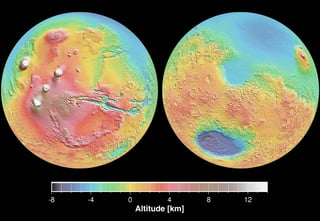If a planet, lets call her Shiloh, had no oceans or liquid water on the surface; Could it still have deep, vast ocean basins? Or would a dry ocean basin level out over time?
2 Answers
Yes
Let's expand on @L.Dutch's answer. Without water, what we have to work with is flora, wind, volcanism, and tectonic movement.
Tectonic movement has the ability to create trenches similar (in fact, identical to...) the Mariana Trench. An not only trenches, but also mountains. Both of these are important as they create difficult-to-erode high and low points on your world.
Volcanism also creates mountains, but more importantly for your world, it seals lighter soils underneath heavier magma flows and erupted ash. This is important as wind has the capacity to move material around like sandpaper, eroding everything theoretically smooth — except that we have high and low points that on your world can be made of basalt (much harder to erode) and the lighter soils the wind moves around are periodically sealed away by volcanism.
If you get down to the science of that statement, it would depend on how much volcanism your planet experiences... but that really depends on just how "perfect" according to our current understanding of science you want your world to be. Often it's not valuable to get caught up in that much detail.
Wind is the primary shape-causing function on your world. If we simplify this, both water and wind should flatten out whatever they erode. Water carries lighter soils just as wind does, so you'd think the Mariana Trench would eventually be filled by soils carried by ocean currents. The truth is that carried soil isn't that deep or that erosive such that the harder geology of the trenches and mountains disappear before they are expanded through tectonics. Consequently, wind is hollowing out soft spots and leaving alone hard spots. What this does mean is that you'll see more formations like those found in Goblin Valley State Park than you do here on Earth because your world has more space for the wind to work.

Hoodoos at Goblin Valley State Park. Brian W. Schaller via Wikipedia.
The amazing thing about Goblin Valley State Park and the many low water and desert regions of Earth is that they all prove you can have a wondrously varied environment, even in terms of altitude, without water. You can have what people might believe are ocean basins, even though they aren't. You'll also have seas of sand... but that's another issue.
Flora Finally, we need to consider the value of flora on your world. You say there's no surface water, so I'm going to assume there's subsurface water. That means deep rooted plants ranging from trees to alfalfa can still flourish on your world, at least in protected areas, and desert plants, especially grasses for additional erosion control will compliment the slower but more permanent solution of volcanism. Flora, like (and in some ways better) than volcanism, will also keep the lighter soils at bay, allowing them to be scooped up in wind-sensitive areas and deposited and then retained in wind-insensitive areas, which will allow your planet to have "ocean" basins.
Conclusion
Frankly, let's look at the surface of Mars, which isn't a perfect fit, but is nevertheless an excellent example of what you're trying to achieve. The map below shows "ocean" basins, mountains and plateaus... basically everything you want. The world doesn't have active volcanism and, yes, it is believed that once it might have had enough water for erosion. But after how ever many eons of time the winds and sandstorms of Mars (and here's the point) have not smoothed the planet.

Mars topography courtesy NASA/JPL.
So I believe what you're looking for far surpasses the baseline of suspension-of-disbelief. In fact, I believe it's entirely plausible to have a world as you describe.
-
1$\begingroup$ @KaffeeByte, as much as I appreciate the green check mark, we recommend that you wait at least 24 hours before awarding it. We have users around the world and human nature is to not pay as much attention to questions with accepted answers than others. You could miss a better and more informative answer. $\endgroup$– JBHCommented Oct 16, 2022 at 17:48
If there are no oceans there is hardly any water cycle, and with the lack of water comes the lack of a substantial erosion agent which speeds up closing the surface asperities.
There might be wind, but considering that a gas is about 1/1000 less dense than water, in the same ratio is also its erosion power. Therefore (ballpark estimate) what water erodes in 1 year, wind will erode in 1000 years.
On the other hand, having an active tectonic without water might be hardly possible.
